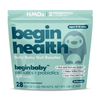5 Foods for a Healthier Heart and Microbiome in Kids
share this article

Nurturing a healthy heart and gut microbiome in kiddos is essential for their overall health and well-being. In this guest blog post, we'll explore seven nutrient-packed foods that not only support a healthier heart but also promote a thriving gut microbiome in little ones, backed by scientific evidence and expert recommendations.
1. Berries
Berries like strawberries, blueberries, and raspberries are rich in antioxidants, fiber, and polyphenols, which support heart health and contribute to a diverse gut microbiome in kids.
2. Yogurt with Live and Active Cultures
Yogurt containing live and active cultures provides beneficial probiotics that support gut health and may lower the risk of heart disease in kiddos by reducing inflammation and improving cholesterol levels.
3. Fatty Fish
Fatty fish such as salmon, mackerel, and trout are packed with omega-3 fatty acids, which support heart health and contribute to a balanced gut microbiome by reducing inflammation and promoting diversity.
4. Leafy Greens
Leafy greens like spinach, kale, and Swiss chard are rich in vitamins, minerals, and fiber, supporting heart health and providing essential nutrients for a flourishing gut microbiome in kids.
5. Nuts and Seeds
Nuts and seeds, such as almonds, walnuts, and flaxseeds, are rich in heart-healthy fats, fiber, and antioxidants, supporting cardiovascular health and contributing to a diverse gut microbiota in kiddos.
Daily reads to help your little ones lead happier and healthier lives.
Join the
Happy Gut Club
Summary
Incorporating nutrient-rich foods like berries, yogurt, fatty fish, leafy greens, nuts, and seeds into little ones' diets can promote a healthier heart and a thriving gut microbiome. By offering a variety of these foods, parents can lay the foundation for lifelong well-being in their kiddos.

















